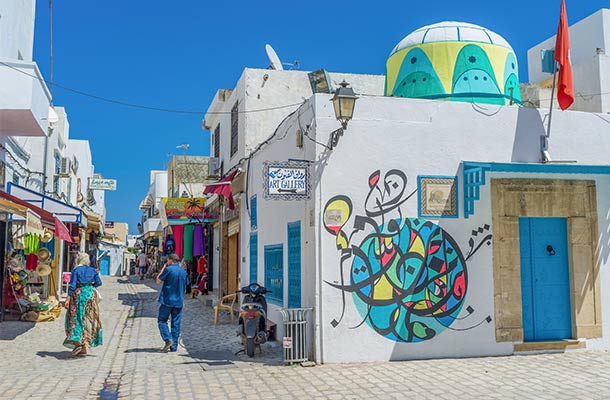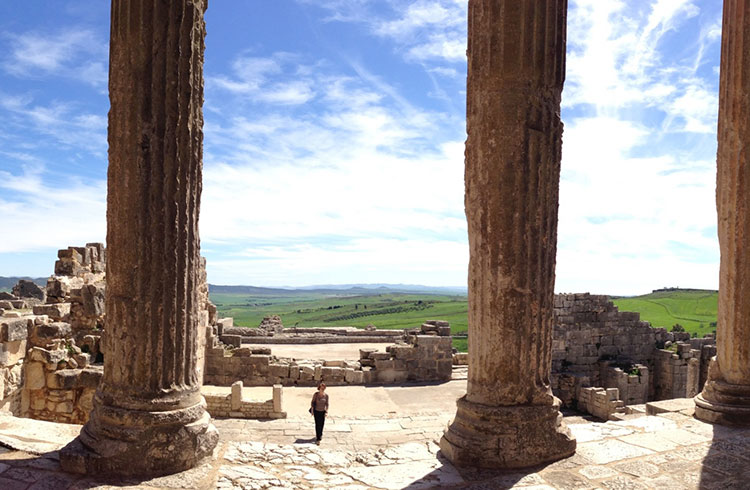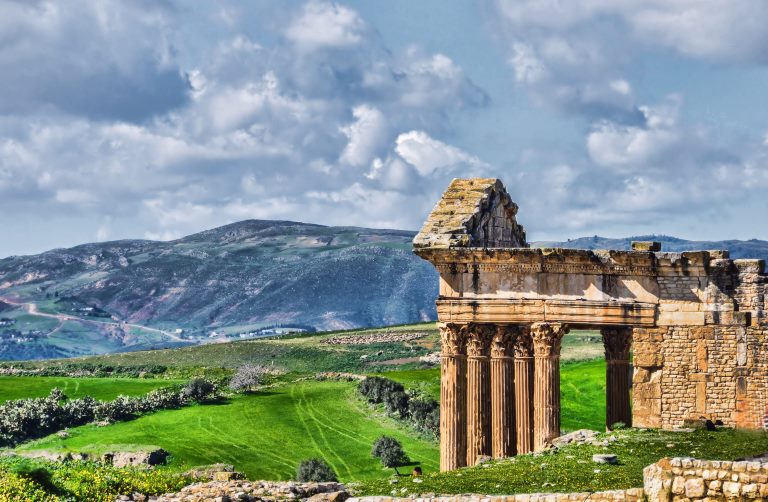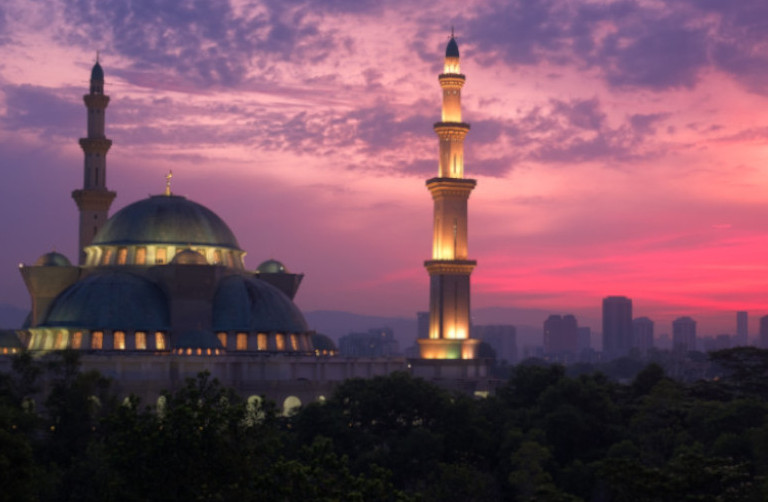Respecting Local Laws and Culture in Tunisia
Tunisia is a Muslim country, and it's important to respect Tunisian culture as well as local laws regarding drugs, photography, and currency.
 Photo © iStock
Photo © iStock
Buying antiquities, being careless about what you photograph, and carrying Tunisian money out of the country can get you into trouble if you don't follow the local laws.
The southern desert areas are quite traditional, but the northern beach resorts (where most travelers go) are more cosmopolitan, and have a fairly European style, so you can be a little more relaxed with how you dress. However, it's still important to dress modestly, especially if you're a woman.
If you're coming to Tunisia after spending a little time in France, be aware that topless sunbathing in public is not acceptable in Tunisia and will cause both offense and unwanted attention.
The dominant language spoken in Tunisia is Tunisian Arabic, though many natives also speak French, especially in the north.
Below are some other useful tips for knowing what's forbidden, and navigating the culture and customs in Tunisia.
- Public displays of affection
- Smuggling of antiquities
- Rules regarding photography
- Drugs in Tunisia
- No free medical for non-citizens
- Currency laws in Tunisia
- Road rules (and whether they are followed)
- Road conditions in Tunisia
Public displays of affection
Even in the less conservative north, Tunisian law applies to personal relationships. Like many Muslim countries, homosexuality is illegal. Public displays of affection between same-sex couples and talking publicly about homosexuality are taboo.
It‘s technically illegal for mixed-gender couples who are unmarried to share a room together. It's not much of a problem in western-style hotels, but elsewhere, just say “wife/husband” rather than “boyfriend/girlfriend” when talking to hotel staff. A gold ring worn on the appropriate finger can smooth the way, too.
Smuggling of antiquities
There is a reasonable amount of antiquities smuggling in Tunisia. People who try to remove antiquities without the right government permits may be arrested, and have a very long delay added to their departure.
Make very sure that, if any of your purchases are antique, you obtain permission. Getting arrested when you‘re trying to leave will definitely ruin your experience.
Rules regarding photography
Tunisia does not allow photographs to be taken of embassies, military, or government buildings, as well as other sensitive places. If you‘re in doubt, look around for one of those “no camera” signs. If you see one, don‘t take the photo.
As in most countries, Tunisians don’t like to be photographed without their permission. Ask first, and you’ll likely be rewarded with a great photo, an interesting cultural interaction, or, at worst, a polite no.
Drugs in Tunisia
Like many countries in the world, drugs are illegal in Tunisia. However, Tunisia tends to have somewhat harsher drug laws than western nations. Use and trafficking are obviously serious offenses, but the possession of even small amounts of “soft” drugs can result in imprisonment. In case you were wondering, yes, one joint or even a small amount of hash or marijuana can result in being locked up.
No free medical for non-citizens
Tunisia has a strong medical system for Tunisian citizens, but not for people who aren‘t. If you do require medical attention in Tunisia, be aware that private hospitals and clinics can be very expensive, and payment is required immediately.
Currency laws in Tunisia
There are some interesting laws regarding currency in Tunisia, and you should make sure you’re aware of them if you’re planning on going. It’s actually illegal to either import or export Tunisian money.
If you're a cash-only type of traveler, take the amount of money you want to spend into the country in your local currency, and convert it into Tunisian Dinars as you need it. Be sure that you declare how much currency (in cash) you’re bringing into the country, or it won’t be leaving with you. Keep receipts for every money change transaction.
Those of us who use the ATM to access funds won't have a problem (although it's always a good idea to keep the receipts ATMs spit out).
Road rules (and whether they are followed)
If you haven’t ever driven in a non-Western country before, driving in Tunisia will be an interesting experience. It's common for local drivers to ignore road regulations, even when police are clearly visible.
Pedestrians have right of way, but not all drivers follow this rule. Pedestrians also frequently run between traffic, even on major highways.
People who ride bicycles, motorcycles, and motor scooters will regularly weave through traffic, attempting to squeeze through incredibly narrow spaces at high speeds. It doesn’t help that few of these vehicles have adequate lights or reflectors, making them difficult to see.
Tunisia has a high number of police and military checkpoints, and if you come across one of these, be sensible and approach slowly. Speeding towards a checkpoint is a good way to make several men with automatic weapons very nervous indeed. Checkpoint authorities tend to be polite to foreign travelers, but you must be ready to present photo ID upon request, and they may detain you if you don‘t have it, particularly if you are near one of the more troubled border regions. Tourists must carry ID with them at all times.
Road conditions in Tunisia
If you are planning on driving outside of the urban areas, be aware that conditions vary. The Tunisian road network is relatively modern and of good quality overall, but road quality can deteriorate rapidly, particularly in the southern part of the country, where many roads are unpaved and/or full of potholes that are covered with blowing sand.
Traveling cross-country and off-road means traveling in the desert. If you‘re not used to that, the advice is fairly straight forward and should be strictly adhered to.
For a start, make sure you‘re traveling in a vehicle that‘s capable of off-road desert travel, which means sedans are out and you really need a four-wheel drive.
Make certain you have enough water and food, and pack a little extra just in case.
Travel in multiple cars so that, if one breaks down, you can get back to civilization in one of the other vehicles.
Take a GPS with you, but be aware that there are many areas in the south that have very little mobile phone coverage, and often none at all.
Lastly, while it does get incredibly hot in summer (as high as 115°F/46°C), the desert is also subject to chilly conditions and night and can even get close to freezing in winter. Even when you‘re traveling in summer, you need to bring something warm for the evening.
Related articles
Simple and flexible travel insurance
You can buy at home or while traveling, and claim online from anywhere in the world. With 150+ adventure activities covered and 24/7 emergency assistance.
Get a quote


5 Comments